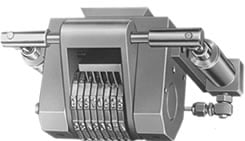Stamping presses combine the customization of steel stamps, type, and dies with medium- to high-volume repeatability in an easy-to-use marking machine.
What is a Stamping Press?
Stamping presses, also referred to as impact presses, are either manual or pneumatic marking machines that incorporate a holder filled with steel type, a shank stamp, a roll die, or a numbering head above the marking surface; force is generated by compressing and then releasing a spring inside the press, and then the die is driven down which transfers the image from the face of the die onto the surface being marked.
In the video below you can see a manual, spring actuated press in action.https://www.youtube.com/embed/W781I5tDcfg
Stamping presses can be integrated into a production line or mounted, like the one in the video above, on a bench top.
Why Use a Stamping Press?
Stamping presses are an excellent marking solution for repetitive indent marking applications. They are low maintenance machines that are relatively straight forward to use. Manual impact presses, in particular, are easy to operate.
One of the most important advantages of a stamping press is that it combines the flexibility and customization of steel stamps, type, dies, and numbering heads with machines that are ideal for medium- to high-volume applications. Stamps, type, and dies can be customized with logos or custom fonts and are manufactured from hardened, high-grade tool steel for long service life and durability.
How Do They Work?
Step 1 – The energy section advances towards the workpiece by gear rack and pinion, powered manually by the operator pulling down the lever.
Step 2 – Once the press stroke is engaged and the workpiece is contacted, the press stroke continues. The workpiece is held in place by the pressure from the energy section (this is a significant safety feature.) The impact spring is compressed and builds force as the press continues to maintain contact with the workpiece.
Step 3 – When the ball bearings reach their release point, the powerful impact is discharged. The impact spring delivers force to the hammer, which in turn strikes the plunger (tool holder.) You can control the amount of impact depending on which spring you choose and how much tension is applied.
Manual Stamping Presses
Manual impact presses offer users a safe, reliable marking solution that is easy to set up and to operate.
This manual style of press is best suited for low- to medium-volume applications. If you’re not sure whether you need a manual or pneumatic stamping press, or have any other related questions, please contact us here.
Unlike more complicated marking solutions, manual impact presses are low maintenance solutions that are easy to set up and operate. The simplicity of the manual press, coupled with the degree of control it offers, its safety, and reliability, make it a popular marking solution. Specifically, high volume repetitive indent marking applications are best handled with the use of impact presses which achieve a very short cycle time that cannot be met with any other marking method.
Pneumatic Stamping Presses
Ideal for high-volume applications, pneumatic impact presses can do more than just stamp. Pneumatic impact presses can be used for part marking, riveting, pressing, assembly, stamping, forming, punching, and shearing.
This style of press can be operated either manually or with a control package (higher volume applications typically dictate use of a control package). See further below for more information on control packages.
When selecting a pneumatic press, there are a few specifications that you should consider to ensure that you are selecting the correct press for your particular marking requirements. Of course, your Durable sales rep can help you with all of the options and features, but in general, the three main areas you will need to consider are the press model, the control package, and the marking dies.
Choose Your Pneumatic Stamping Press Model
Pneumatic impact presses are ideal for high volume, repetitive indent marking, assembly, stamping, forming, punching, and shearing. Because there are so many ways a pneumatic press can be used, there are a few things to consider when choosing an impact press.
Most of the pneumatic presses sold are of the bench top variety, although U-model presses for inline marking are available as well. The first thing you need to do is decide which size (model) is appropriate for your marking requirement. Generally speaking, the larger the press, the more impact force it can generate. The two main variables that will determine the correct impact press size will include the material being marked and the amount of text (number of characters and character height).
Choose Your Pneumatic Stamping Press Control Package
.jpg?width=300&name=safeball-control-for-pneumatic-press%20(1).jpg) Pneumatic presses can be operated manually using the control lever but in most cases, operator’s will use a control package to activate the press. We carry three pneumatic press control packages that are designed to give you a range of options. Which control package you chose will depend on the press model that it’s being used with, your preference for safety and ease of use, as well as your budget.
Pneumatic presses can be operated manually using the control lever but in most cases, operator’s will use a control package to activate the press. We carry three pneumatic press control packages that are designed to give you a range of options. Which control package you chose will depend on the press model that it’s being used with, your preference for safety and ease of use, as well as your budget.
Choose Your Stamping Press Marking Dies
Pneumatic presses can make use of shank stamps, steel type with a holder, or numbering headsfor sequential marking. Your marking requirement will usually dictate which marking dies make the most sense.
 There is no right or wrong answer when it comes to choosing between a stamp, type, or numbering head. All three are machined from high quality, long lasting steel and can be customized. Numbering heads, however, are designed for serial numbering and sequential part marking, so they are not ideal for all applications.
There is no right or wrong answer when it comes to choosing between a stamp, type, or numbering head. All three are machined from high quality, long lasting steel and can be customized. Numbering heads, however, are designed for serial numbering and sequential part marking, so they are not ideal for all applications.
Stamping Press Applications
The popularity of the impact press is also due to its versatility. An impact press can be used for a wide variety of applications other than marking including:
- Stamping
- Riveting
- Staking
- Forming
- Punching
- Bending
- Crimping
- Piercing
- Assembling
- Broaching
- Coining
Stamping presses are typically found in industrial and manufacturing settings, and over the years we have helped a number of companies find the right press for their particular application. You can check out a couple of those applications below.

